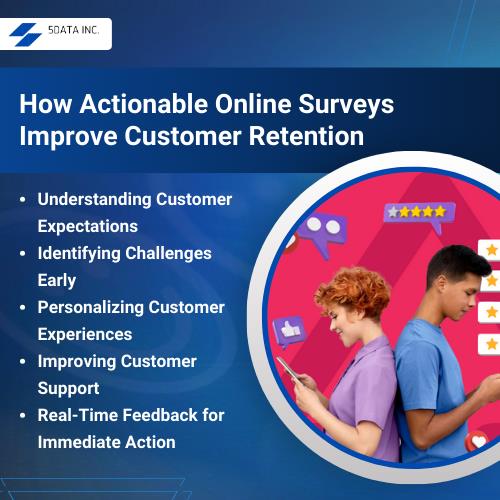Online surveys are powerful tools that help businesses gauge customer sentiments, identify patterns for improvement, and understand their customers’ journey. By utilizing practical customer insights from surveys, businesses can craft strategies that cater to the evolving needs of their customer base, improve customer experience, and foster long-term relationships.
We will explore how actionable online surveys can help improve customer retention, delve into the importance of customer feedback, and answer some frequently asked questions on how customer experience surveys can contribute to retention.
Key Takeaways
- Use surveys to understand customer needs and refine offerings, reducing churn.
- Identify and resolve pain points promptly through feedback, improving retention.
- Personalize experiences and support based on survey insights to build customer loyalty.
Why Customer Retention Matters
Customer retention refers to the ability to maintain and retain existing customers for a long time. It goes beyond being a cost-effective alternative to acquiring new customers. It also offers significant advantages, including repeat purchases, customer referrals, and valuable insights for continuous improvement. As such, it plays a vital role in ensuring long-term success in today’s competitive market.
On the other hand, when businesses struggle to retain customers, they face the issue of customer churn, which can hinder growth and profitability. This is the loss of clients or users over time, and it can severely hinder growth and profitability. On the other hand, loyal customers tend to have a longer customer lifetime value, which increases revenue per customer.
By investing in retention tactics and focusing on improving customer retention, businesses can foster customer success and strengthen their customer pool for sustainable growth.
Data collection and data management service providers offer solutions to help businesses gather, organize, and securely store information, enabling more informed decision-making.
The Role of Customer Feedback in Retention
Customer feedback is the cornerstone of understanding how well your business is meeting your customers’ needs and expectations. Through surveys, you can gather instant feedback that reflects the new customer’s experience at different stages of the customer’s journey. This response is crucial in identifying areas for improvement and ultimately enhancing client satisfaction, a key factor in customer retention.
To improve customer retention, gathering feedback plays a critical role in identifying patterns, addressing challenges, and ultimately improving client satisfaction. Online surveys can be used at various touchpoints, such as:
- Post-purchase: Understand the satisfaction level of customers immediately after they make a purchase.
- Post-purchase: Understand the satisfaction level of customers immediately after they make a purchase.
- Onboarding process: Gauge how effective your introduction process is in helping customers understand your product growth platform or service.
- Customer service: Measure customer satisfaction with the support they receive.
- Product feedback: Get insights on product features, usage, and performance.
- Surveys to gauge customer loyalty: Use metrics such as the customer loyalty score to assess customer loyalty and their likelihood to make recommendations.
Through effective surveys, businesses can track key metrics related to customer trust, satisfaction, and retention. These metrics ultimately provide valuable insights to improve products, services, and the overall customer experience. A mobile application development company focuses on creating custom apps designed to enhance user engagement and support business growth in the mobile-first world.

How Actionable Online Surveys Improve Customer Retention
- Understanding Customer Expectations: One of the primary reasons customers churn is that their expectations still need to be met. By using customer satisfaction survey templates, businesses can accurately gauge what customers want and need. This information empowers businesses to refine products, adjust sales messages, and develop more targeted customer retention strategies, putting them in control of their customer relationships.
- Identifying Challenges Early: Online surveys allow businesses to gather feedback on customer concerns and obstacles. Whether it’s a pain point during the orientation process, a self-service support issue, or frustration with specific product quality, identifying these challenges early is a proactive step. Once businesses identify these challenges, they can implement solutions promptly, reducing the likelihood of customer churn.
- Personalizing Customer Experiences: Actionable insights gathered from consumer surveys enable businesses to personalize their communication and services. By understanding user requirements and preferences, businesses can create a more personalized experience for each customer. This level of personalization not only strengthens the relationship with current customers but also increases their likelihood of remaining loyal.
- Improving Customer Support: Surveys are also excellent tools for assessing the quality of customer support. Asking for feedback on support interactions helps businesses evaluate the efficiency of their support team and the effectiveness of their communication channels. Whether it’s through live chat, email, or phone support, understanding how customers feel about the support they receive can drive improvements in both service quality and response time.
- Real-Time Feedback for Immediate Action: Online surveys is that they can collect feedback in real time. This means businesses can act quickly on feedback, ensuring that challenges are addressed before they escalate. Real-time response helps businesses stay agile, responding to customer requirements and issues in a timely manner, which can be key to retaining customers.
A simple customer survey can ask customers about their experience with the product, their expectations, and whether those expectations were met. With this data, businesses can adjust their product range to meet or exceed those expectations.
Once businesses identify these challenges, they can implement solutions promptly. Addressing issues quickly will reduce the likelihood of customer loss, as clients are more likely to stay with a company that listens to and acts upon their feedback.
Personalization can be achieved by segregating users based on their survey response rate, tailoring marketing messages, or offering personalized product recommendations.
A Software Application Development Company specializes in designing and building custom software solutions tailored to meet specific business needs and drive innovation.
Conclusion
Leveraging actionable online surveys to improve customer retention is important in a successful business strategy. By consistently collecting customer feedback, evaluating insights, and applying retention strategies, companies can better align with consumer expectations, address issues, and cultivate long-term relationships with honest customers.
Effective use of surveys helps businesses stay attuned to consumer needs, which is essential for driving product development, improving satisfaction, and reducing churn. As businesses focus on customer success, surveys become an invaluable tool for refining product offerings, enhancing support, and fostering deeper engagement with customers at every stage of their experience.
Frequently Asked Questions
1. How do Customer feedback forms directly impact retention?
Customer feedback forms reveal critical insights that businesses can use to address pain points, improve satisfaction, and reduce churn.
2. How frequently should I conduct customer surveys?
The frequency depends on the specific goals, but surveys at key points in the consumer’s journey provide timely insights.
3. What metrics are most useful for retention-focused surveys?
Net Promoter Score (NPS), Customer Satisfaction Score (CSAT), and Customer Effort Score (CES) are particularly valuable for retention tracking.

Rasmita Patro
Author
